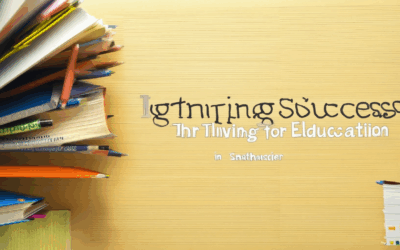Achieving academic excellence isn’t just about innate talent; it’s about leveraging effective strategies that cater to individual learning styles and needs. In today’s fast-paced educational environment, students encounter numerous challenges—from managing time effectively to adapting to diverse learning requirements. Whether it’s mastering effective study habits, employing goal-setting techniques, or implementing feedback loops to refine performance, there’s a wealth of proven approaches designed to enhance academic outcomes. This comprehensive guide delves into these strategies, offering practical insights that can empower students to unlock their full potential and thrive in their educational journey.
Key Takeaways
- Develop a structured academic strategy by defining clear, achievable goals, allocating resources wisely, and managing time effectively to stay organized and motivated.
- Prioritize mental health and well-being to reduce stress and enhance academic performance.
- Avoid common pitfalls like overloading your schedule and setting unrealistic expectations to avoid burnout and poor preparation.
- Engage in peer learning groups, seek tutoring, attend time management workshops, and build consistent study habits to boost learning outcomes.
- Access a variety of resources, including textbooks, online materials, and workshops, to support your academic journey.
- Implement academic interventions such as tutoring programs, mentorship initiatives, study groups, and technology-driven tools to address specific challenges and enhance learning.
- Leverage networking opportunities with mentors and professionals to gain insights and open doors to future opportunities.
Five Strategies for Academic Success
- Stay Organized: Use tools like planners or digital calendars to track assignments, exams, and deadlines. Breaking tasks into smaller steps can make studying and completing work more manageable.
- Practice Active Learning: Engage with material through discussions, teaching others, or applying concepts to real-world scenarios to enhance retention and understanding.
- Manage Time Effectively: Prioritize tasks based on deadlines and difficulty, allowing time for review and practice. Avoid procrastination by setting clear goals and timelines.
- Become a Lifelong Learner: Explore hobbies and interests that stimulate your mind, as diverse skills contribute to academic success. Stay curious and open to new ideas.
- Build Strong Relationships: Connect with peers, mentors, and teachers who can offer support, feedback, and guidance. Collaborative learning can also boost understanding and confidence.
For more insights and actionable tips, visit Enroll Maven’s Academic Success Guide to discover proven techniques and resources tailored for students.
What Are the Six Learning Strategies for Students?
Here are six proven learning strategies that can significantly enhance your academic performance:
- Spaced Practice
- Distribute your study sessions over time rather than cramming.
- Why it works: This method reinforces memory retention and reduces forgetting.
- How to apply: Create a schedule and review material at increasing intervals.
- Retrieval Practice
- Test yourself on the material instead of just re-reading notes.
- Why it works: Active recall improves long-term retention.
- How to apply: Use flashcards or write summaries from memory.
- Elaboration
- Connect new information to what you already know.
- Why it works: Creates stronger mental associations and deeper understanding.
- How to apply: Explain concepts in your own words or relate them to personal experiences.
- Concrete Examples
- Use real-life scenarios or examples to understand abstract ideas.
- Why it works: Makes complex concepts easier to grasp.
- How to apply: Look for analogies or case studies in textbooks.
- Dual Coding
- Combine verbal and visual information for better comprehension.
- Why it works: Enhances understanding by engaging multiple cognitive processes.
- How to apply: Pair written notes with diagrams, charts, or images.
- Interleaving
- Mix different topics or subjects during study sessions.
- Why it works: Prevents forgetting and promotes flexible thinking.
- How to apply: Alternate between unrelated subjects to keep things interesting.
By incorporating these strategies into your study routine, you can maximize your learning potential and achieve better results. Remember to stay focused, seek help when needed, and take regular breaks to reinforce what you’ve learned.
What Are the 7 Strategies That Promote Learning?
We’ve compiled a list of effective strategies to enhance learning experiences:
- Active Learning:** Engage with the material actively through discussions, debates, or hands-on activities to reinforce memory and understanding.
- Spaced Repetition:** Review and practice information at increasing intervals over time to improve retention and recall.
- Crossword Puzzles and Mind Maps:** Utilize creative tools like crossword puzzles and mind maps to connect new information with existing knowledge.
- Dual Coding:** Combine verbal and visual information by associating words with images, diagrams, or graphs to enhance comprehension.
- Interleaved Practice:** Mix different topics or subjects during study sessions to promote connections between concepts and reduce forgetting.
- Teach Someone Else:** Explaining a concept to others forces you to understand and retain the information more effectively.
- Chunking:** Break down complex information into smaller, manageable parts to make learning less overwhelming and more efficient.
Academic Strategy
An academic strategy is a structured approach to planning and executing educational goals effectively. It involves setting clear objectives, organizing resources, and establishing a roadmap to achieve those objectives. This strategy ensures that students, educators, and institutions can maximize their potential and outcomes.
Components of an Academic Strategy
- Goal Setting : Define short-term and long-term academic goals. Whether it’s excelling in coursework, preparing for exams, or pursuing further education, having well-defined goals provides direction.
- Resource Allocation : Identify and utilize the necessary tools, materials, and support systems needed to accomplish your academic objectives. This may include textbooks, study guides, tutoring services, or online platforms.
- Time Management : Create a schedule that balances academic responsibilities with personal commitments. Effective time management is crucial for meeting deadlines and maintaining overall well-being.
- Milestone Tracking : Break down larger objectives into smaller, measurable tasks. Regularly assessing progress helps in staying on track and making necessary adjustments.
- Adaptation : Recognize that academic plans may need to evolve. Stay flexible to adapt to changes in circumstances, challenges, or new opportunities.
- Support Systems : Leverage available support networks, whether through peers, mentors, or professional organizations, to enhance learning and growth.
Benefits of an Academic Strategy
- Improved Performance : By aligning efforts with clear goals, individuals can focus their energy more effectively, leading to better results.
- Reduced Stress : A well-planned strategy can help manage expectations and minimize anxiety associated with academic pursuits.
- Long-Term Success : Developing strong academic habits and strategies contributes to overall life success, regardless of chosen career paths.
Common Mistakes to Avoid
- Overloading the schedule without considering rest and self-care.
- Neglecting to set realistic expectations based on individual capabilities and time constraints.
- Inadequate preparation for critical assessments or projects due to poor time management.
By implementing a thoughtful academic strategy, individuals can navigate educational pathways more efficiently, ultimately achieving their aspirations.
For more insights and resources on optimizing your academic journey, visit Enroll Maven or explore similar platforms like StudyCram and ExamGuru . These platforms offer tailored strategies and tools to support academic success.
Academic Support Strategies
Effective academic support strategies are essential for helping students achieve their goals and succeed in their educational journey. Below are some proven approaches that can significantly enhance academic performance:
1. Peer Learning Groups
Forming study groups with peers can foster collaboration and mutual support. Regular meetings to discuss topics, share resources, and tackle challenges can improve understanding and confidence.
2. Tutoring and Academic Coaching
Accessing tutoring services or hiring an academic coach can provide personalized guidance tailored to individual needs. This helps identify gaps in knowledge and develop stronger problem-solving skills.
3. Time Management Workshops
Learning effective time management techniques is crucial for balancing coursework, extracurricular activities, and personal life. Workshops or tools like planners can help organize schedules effectively.
4. Study Habits Reinforcement
Encouraging consistent study habits, such as setting aside dedicated study time each day, can lead to better retention and understanding. Consistency is key to long-term academic success.
5. Access to Resources
Providing access to necessary resources, whether they are textbooks, online materials, or workshops, ensures students have every tool they need to excel. This includes both physical and digital resources.
6. Mental Health Support
Addressing mental health is equally important. Programs or resources focused on stress management, counseling, and mindfulness can help students maintain emotional well-being, which is vital for academic performance.
7. Feedback and Improvement
Regular feedback sessions with teachers, mentors, or advisors can help students understand their strengths and areas for improvement. This constructive criticism is invaluable for growth.
8. Networking Opportunities
Connecting with alumni, professionals, and industry experts through events, mentorship programs, or networking events can provide valuable insights and inspiration. These interactions can also open doors to opportunities.
By implementing these strategies, educational institutions can create a supportive environment that empowers students to thrive academically and personally. Remember, consistency, engagement, and seeking help when needed are key components of long-term success.
Academic Intervention Example
An academic intervention is a structured program or initiative designed to enhance academic performance, learning outcomes, or overall educational experiences. These interventions are typically implemented to address specific challenges or to promote improved learning and achievement.
Types of Academic Interventions
- Tutoring Programs
- Provide individualized support for students struggling with specific subjects or areas of study.
- Examples: Peer tutoring, professional tutoring services, and after-school tutoring programs.
- Mentorship Initiatives
- Pair students with mentors who offer guidance and support throughout their academic journey.
- Examples: University mentorship programs, industry mentorships, and peer mentoring networks.
- Workshops and Seminars
- Offer targeted training sessions on specific topics or skills relevant to the field of study.
- Examples: Study skills workshops, professional development seminars, and skill-building clinics.
- Study Groups
- Facilitate collaborative learning environments where students can discuss and work on assignments together.
- Examples: Student study groups, collaborative learning clubs, and study-buddy systems.
- Technology-Driven Interventions
- Utilize digital tools and platforms to enhance learning and engagement.
- Examples: Online learning platforms, adaptive learning software, and gamified learning apps.
- Skill Development Programs
- Focus on developing essential skills such as critical thinking, communication, and problem-solving.
- Examples: Leadership development programs, soft skills training, and career readiness workshops.
- Competitions and Challenges
- Motivate students through competitive activities that encourage academic excellence.
- Examples: Math competitions, essay contests, and science fair projects.
- Peer-Assisted Learning
- Leverage the knowledge and expertise of peers to facilitate learning and understanding.
- Examples: Peer instruction models, study groups led by advanced students, and knowledge-sharing forums.
Conclusion
Academic interventions are versatile and can take many forms, from traditional tutoring to innovative tech-driven solutions. They aim to create supportive learning environments that foster academic success and personal growth. By implementing effective academic interventions, institutions and educators can help students overcome barriers, achieve their full potential, and contribute positively to their fields.









0 Comments